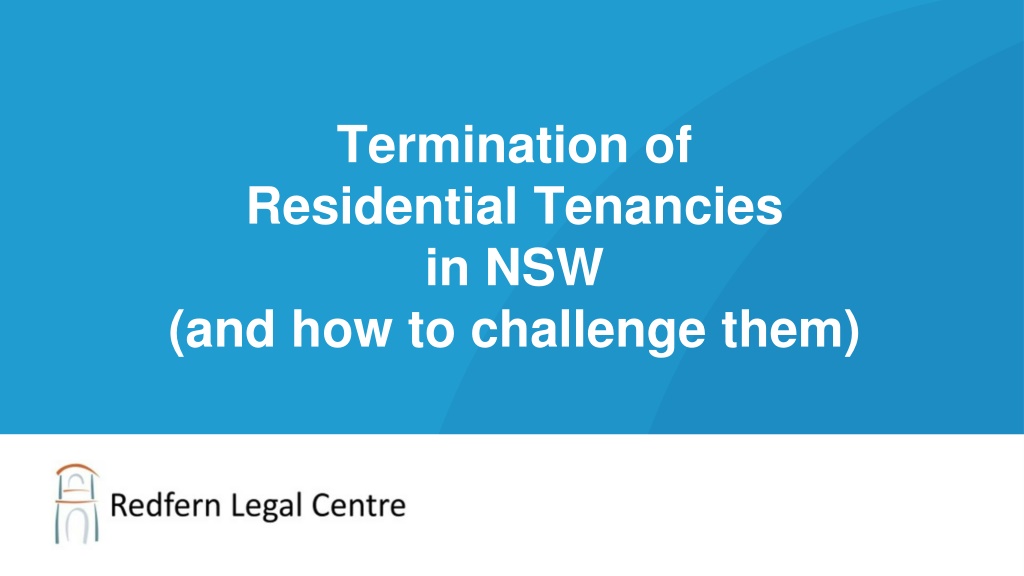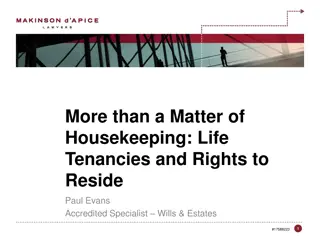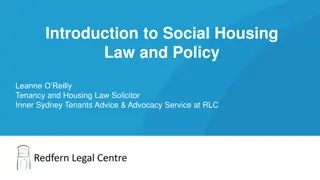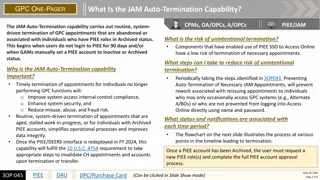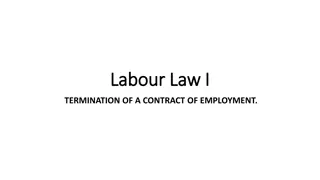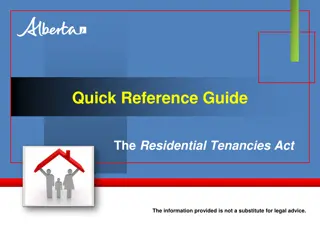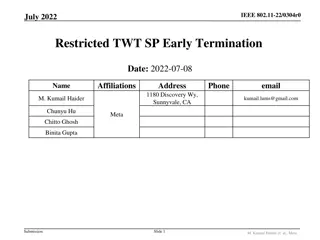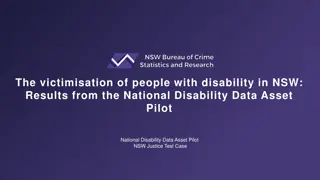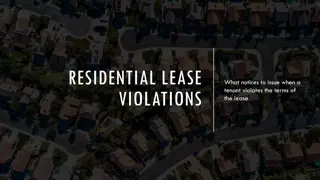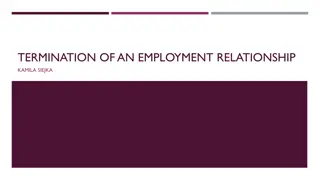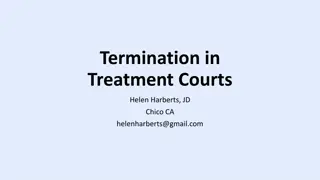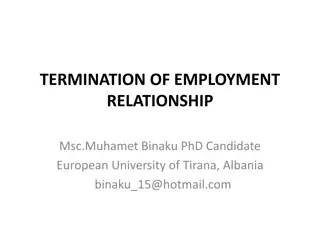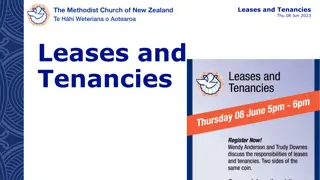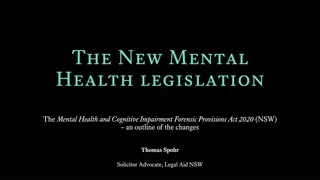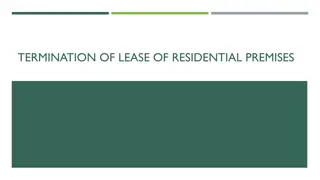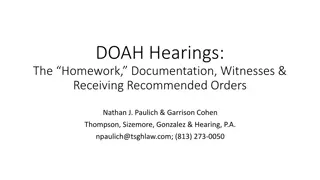Understanding Termination of Residential Tenancies in NSW
Explore the process of terminating residential tenancies in NSW, including eviction grounds, tenant termination rights, unlawful lockouts, and how to challenge terminations. Learn about the steps involved, from issuing a notice of termination to obtaining a warrant for possession from the NSW Civil and Administrative Tribunal. Find resources and support for navigating tenancy disputes effectively.
Download Presentation

Please find below an Image/Link to download the presentation.
The content on the website is provided AS IS for your information and personal use only. It may not be sold, licensed, or shared on other websites without obtaining consent from the author. Download presentation by click this link. If you encounter any issues during the download, it is possible that the publisher has removed the file from their server.
E N D
Presentation Transcript
Termination of Residential Tenancies in NSW (and how to challenge them)
Alison Mackey Tenancy Solicitor Inner Sydney Tenants Advice & Advocacy Service Redfern Legal Centre
Acknowledgement Of Country
Outline 1. Overview of termination process 2. When can a tenant be evicted? 3. When can a tenant terminate the tenancy agreement? 4. Unlawful lockouts 5. Questions and where to get help Resources: https://rlc.org.au/events/terminations-evictions-nsw
1. Overview of the termination process 5
Overview of the Termination Process a) Notice of termination b) Application to NSW Civil and Administrative Tribunal (NCAT) c) NCAT hearing d) NCAT orders termination and possession e) NCAT issues warrant for possession f) Office of NSW Sheriff executes warrant for possession; locks are changed
Overview of the Termination Process (a) a. Notice of Termination A valid notice of termination should include: the address of the residential premises the date on which the tenancy agreement is terminated AND the date by which vacant possession of the premises is to be given the ground for the notice (reason for terminating the tenancy). You DO NOT HAVE TO MOVE OUT on the date on the Notice of Termination.
Overview of the Termination Process (b) b. Application to NSW Civil and Administrative Tribunal (NCAT) In a situation where a tenant is still in the premises after the date of vacant possession, landlord must apply to NCAT for orders for termination/possession. The landlord cannot just come and change the locks of the premises or bring police to get a tenant out. There are some circumstances where a landlord (or a tenant) can apply directly to NCAT for termination orders without first issuing a notice of termination.
Overview of the Termination Process (c) c. NCAT hearing Will receive notice of conciliation hearing Conciliation hearing first hearing in the NCAT process. NCAT will ask both parties to try and conciliate/negotiate to try and reach an agreement If no agreement can be reached, the matter will either be heard on the day or adjourned for formal hearing at later date Very important always attend the hearing unless the NCAT tells you in writing that you do not need to attend.
Overview of the Termination Process (d) d. NCAT orders termination and possession If NCAT agrees tenancy should be terminated, it will make termination and possession orders. A new date will be set by which the tenant is required to give vacant possession of the premises. If you think the wrong decision has been made seek advice ASAP about whether there are grounds to have the orders set aside or to appeal! Strict time limits for these actions.
Overview of the Termination Process (e) e. NCAT issues warrant for possession If tenant is still in premises after the vacant possession date ordered by NCAT, landlord can apply to NCAT for warrant for possession. Once NCAT issues warrant for possession, it will be sent to NSW Sherriff s Office. Landlord and Sherriff s Office will book a time for the warrant to be executed they don t have to tell the tenant when this will be. If notified that warrant for possession has been issued, you should pack a bag of all important documents, possessions and medications.
Overview of the Termination Process (f) f. Sheriff of NSW executes warrant for possession and locks are changed When Sheriff turns up with warrant to be executed, very important to comply with the Sheriff. Have a bag packed with important documents and possessions, medications and other essential items. Important to note that once the warrant has been executed by the Sheriff, any NCAT decision cannot be set aside or appealed. The tenancy is over at this point.
2. When can a tenant be evicted? 13
When can a tenant be evicted? Most common types of evictions by landlords in NSW: Breach of the residential tenancy agreement (including for rental arrears) 14 days written notice End of fixed term agreement 30 days written notice No grounds 90 days notice (only in periodic or rolling tenancy agreements; not during fixed term) Sale of premises 30 days notice (only in periodic or rolling tenancy agreements) Remember you do not have to be out of the premises by the date on the Notice of Termination.
3. When can a tenant terminate the tenancy agreement? 15
When can a tenant terminate the tenancy agreement? Landlord has breached the agreement 14 days written notice (or application directly to NCAT under s 103) End of fixed term 14 days notice No grounds 21 days notice (periodic agreements only, not allowed in fixed term) If the premises has become uninhabitable notice can take effect immediately Domestic violence notice can take effect immediately, needs to be accompanied by evidence such as ADVO or competent person statement
4. Unlawful lockouts 17
Unlawful lockouts Landlords cannot just change the locks/kick a tenant out of the premises. Proper process we discussed at the beginning of the webinar MUST be followed. Only the Sheriff of NSW can execute a warrant for possession. A person who unlawfully locks out a tenant can face a penalty of up to $22,000.
Public Housing Redevelopment Tenants Advice Service Quick note for tenants affected by public housing relocations: RLC has just obtained funding to assist public housing tenants who are affected or likely to be affected in any way by current or proposed relocations of public housing properties in the inner Sydney area. Can assist tenants with any enquiries related to relocations, including: issues with relocation statements/interviews, identified housing needs, repairs not being completed due to proposed relocation etc.
5. Questions & where to get help 20
Questions? Alison Mackey Solicitor Redfern Legal Centre esources: www.rlc.org.au/training/resources/dvt Resources: https://rlc.org.au/events/terminations-evictions-nsw
Tenants Advice & Advocacy Services www.tenants.org.au fact sheets and sample letters free confidential legal advice on social housing - enter your suburb
Before You Go Your feedback helps us improve our training. Please stay with us for another 60 seconds rlc.org.au/training Training: rlc.org.au/training education@rlc.org.au Enquiries: Nick Manning education@rlc.org.au This workshop is a guide to the law in NSW, Australia. It is not a substitute for legal advice. If you have a legal problem, seek legal advice from a legal centre or Legal Aid.
